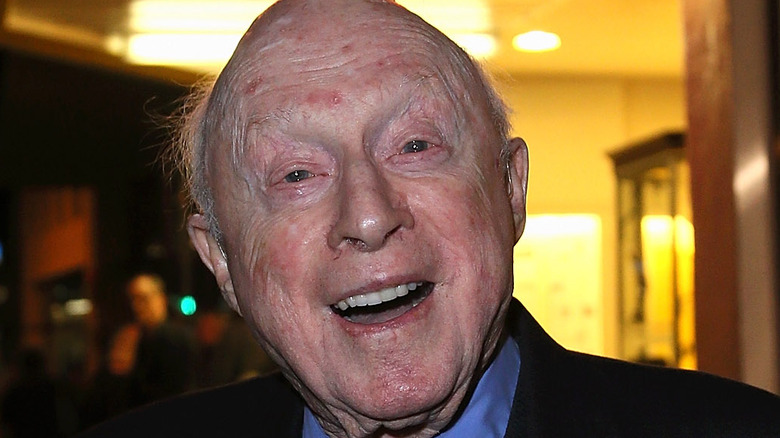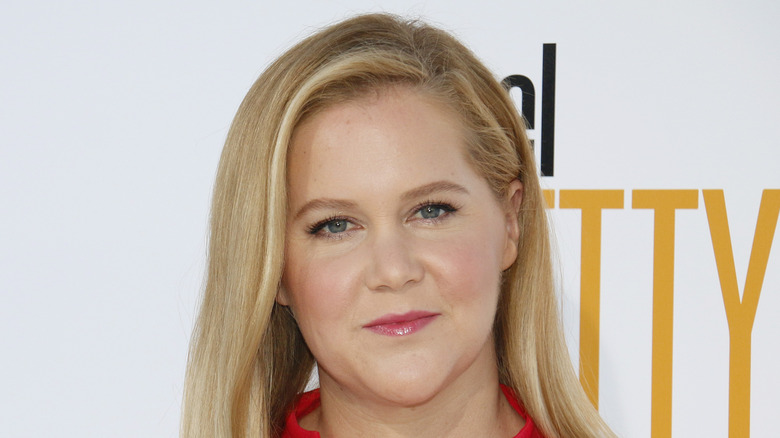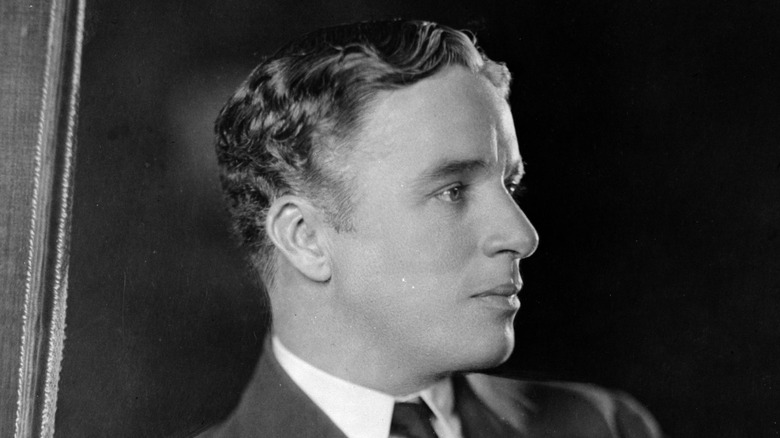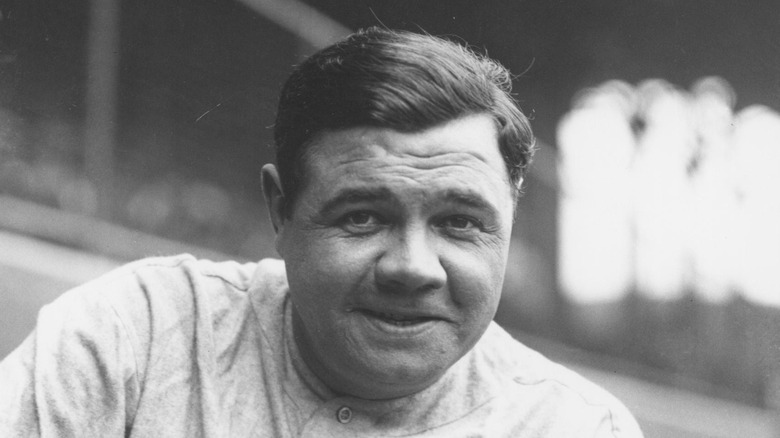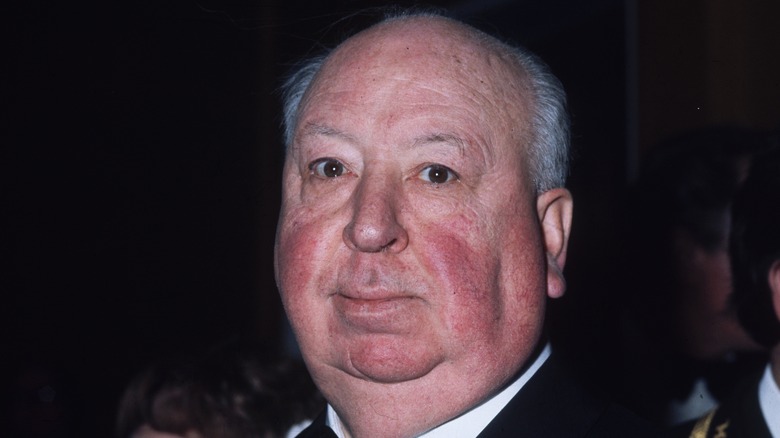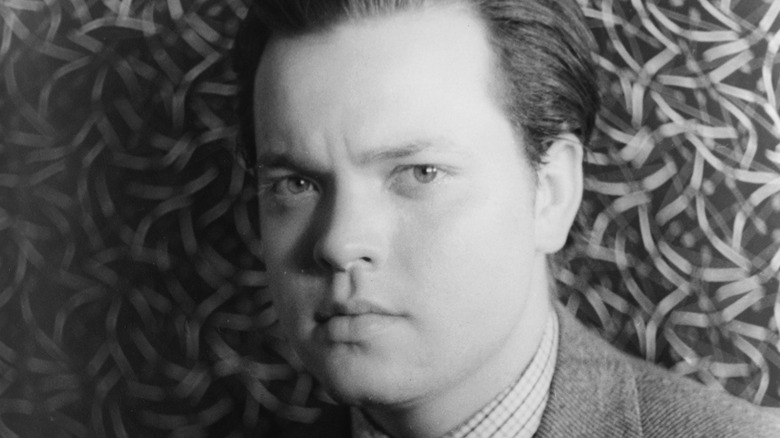The Untold Truth Of Norman Lloyd
A star of radio, stage, screen, and television, Norman Lloyd may not be the first name you think of when you hear "Hollywood's Golden Age." Few actors, though, witnessed the full arc of 20th century show business like Lloyd did, born in 1914 and dying of natural causes in 2021 at the age of 106, according to The New York Times. Working in the entertainment industry for more than a century, and alongside some of film history's most well-known names, including Orson Welles and Alfred Hitchcock, Norman Lloyd witnessed a number of significant historical events, as well as many things that are likely now lost to time.
What secrets would Norman Lloyd tell if he were here today? Could it be possible there are untold truths to learn about someone who spent so long in the public eye? Unfortunately, Norman Lloyd likely took many of those secrets and untold truths with him when he died, but not all. Here are some things that few people know about this underrated star of stage and screen.
His last film was released more recently that you think
Most people imagine spending their golden years relaxing by a lake or spending their time with grandchildren. Norman Lloyd, however, just kept working. Lloyd's last film, "Trainwreck," an Amy Schumer vehicle (above) also starring Bill Hader, came out in 2015, according to IMDb — when Norman Lloyd was more than 100 years old. That wasn't the only late-career appearance Lloyd made in a movie, either. In 1989, he played the strict school headmaster Mr. Nolan alongside Robin Williams and Ethan Hawke in "Dead Poet's Society."
Referring to "Trainwreck," Lloyd wasn't sure he wanted to take the part in the movie because of the dirty subject matter. As Lloyd recalled to The Telegraph, "My daughter, who's 76, walked out of the picture. She wrote me a letter — 'It's not the kind of picture I thought I'd see you in, Dad!' " No matter what decade he worked in, though, Norman Lloyd unfortunately never won an Oscar, for "Trainwreck" or, for that matter, any of his other film appearances. He did, however, pick up two Emmys for his TV work, according to IMDb.
He played tennis with legends
Norman Lloyd wasn't just an actor. He was also an avid tennis player, only giving up the game near his 100th birthday. Anyone playing tennis at that age is remarkable in their own right, but it's some of Lloyd's opponents on the court that make this part of the Norman Lloyd story truly remarkable. One of them was Charlie Chaplin (above) — who was also quite an enthusiast for the game, according to The Guardian.
Other opponents of Lloyd's on the tennis court included actors Joseph Cotten and Spencer Tracy. Lloyd kept playing tennis twice a week until the age of 99, according to the Los Angeles Times. Tennis played a part in one of Lloyd's most well-known roles, in fact, as he only agreed to take the part in "Dead Poets Society" after he played a tennis match with the director, Peter Weir. Of his favorite game, Lloyd said in a 2000 interview with the Television Academy, "With the application and time I have devoted to it, I should have been a reigning World Champion."
He attended two World Series Games in two different centuries
Tennis wasn't the only game about which Norman Lloyd was passionate. He was also a fan of baseball. In a 2015 interview with The Telegraph, Lloyd's shelves are described as overflowing with baseball books, and it's also mentioned that one of Lloyd's favorite pastimes late in life was watching baseball by himself. Notably, Norman Lloyd got to see two World Series games in person. What's most extraordinary is that these games were nearly a century apart.
Watching Lloyd's first World Series game at the age of 11 in 1926 meant he saw Babe Ruth (above) play in the series, and in what would be the last World Series game he attended, in 2017, Lloyd saw the Dodgers play the Astros for the championship. At his age, Lloyd was old enough to remember when the Dodgers were in Brooklyn, attending his first Dodgers game at Ebbets field back in 1927, according to ESPN. "They were awful, but I loved them. I have ever since. After all, they followed me to Los Angeles after I moved here," he said.
He's a star of the small screen as well
The big screen wasn't the only area where Norman Lloyd found success. He also appeared in several well-known and popular TV shows throughout his career, stretching all the way back to the early days of the medium, on programs like "The Joseph Cotten Show," a variety show on the air from the mid to late '50s, according to IMDb. Lloyd also appeared several times in "Murder She Wrote," starring Angela Lansbury; "The Alfred Hitchcock Show" (Lloyd would go on to work several times with the legendary director, pictured above); and he even has a place in the heart of Trekkies for his portrayal of Professor Galen in a 1993 episode of the series "Star Trek: The Next Generation," per IMDb.
Lloyd's most notable TV work, though, is perhaps his time spent on the medical drama "St. Elsewhere," playing Dr. Daniel Auschlander, a role that would catch the attention of "Dead Poets Society" director Peter Weir. For fans of TV made in this century, though, Lloyd is perhaps most recognizable for a guest appearance he made in 2010 on the hit TV show "Modern Family."
He was almost in the greatest movie ever made
Norman Lloyd's résumé includes many well-known movies and TV shows, so luckily his career hasn't been defined by one film classic he turned down, "Citizen Kane," considered by many to be the greatest movie ever made, according to Screen Rant. Lloyd knew the film's writer and producer, Orson Welles (above), who also starred in the picture, from the time the two performers spent in the Federal Theatre project, a New Deal WPA stage project from the Roosevelt Administration, according to Britannica.
The two close friends would go on to work together several times throughout their careers. After joining Welles in Hollywood to act in Welles' adaptation of the Joseph Conrad classic novel "Heart of Darkness," funding fell apart on the project, and Lloyd returned to New York rather than sticking with his old friend while he financed his next picture, "Citizen Kane" — a decision Lloyd would long regret, according to Roger Ebert. Lloyd was newly married and wanted the steady income New York radio provided. (He stayed married, too, for 75 years; his wife, Peggy Craven, died at 98 in 2011.) Luckily, Lloyd went on to appear in several other well-received projects, and missing out on "Citizen Kane" didn't permanently scuttle all his acting opportunities.
